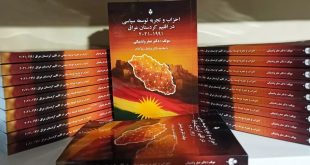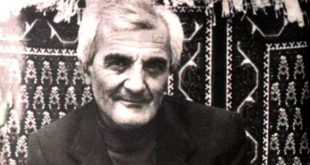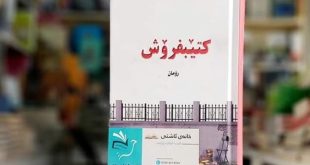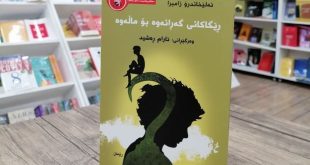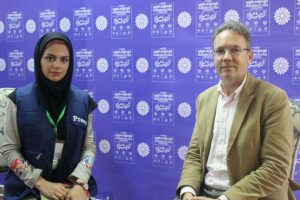
Kurdishbookhouse exclusive interview with Professor Michiel Leezenberg
Interviewer: Sepideh Amiri
Sepideh Amiri: Professor Michiel Leezenberg, it is a great honor to have you here as our guest, what’s your affiliation professor? Would you introduce yourself to our audience in order to clarify your presence in Kurdish Elites Congress?
Michiel Leezenberg: Officially I work in the university of Amsterdam, in the department of philosophy. But I teach a lot of courses on Islamic philosophy also, next to that, I’m also a linguist. I have done a lot of work on the history of the language and the literature of the Kurds. So, I have done a lot of works on specially figures like Ali Taramakhi, Mullah Mahmud Bayazidi. They are very important figures in the intellectual history of the Kurds, and they are part of a bigger project what I called “vernacularization.” This is a process by which spoken languages, like Kurdish or Albanian become written and start to be used as literary and literal language, also the language of learning.
Sepideh Amiri: But why Kurds? Why Kurdish?
Michiel Leezenberg: I became interested in the Kurds more or less by accident. I was traveling in the Middle East in countries like Turkey and Syria, I met a lot of Kurds and I started to hear about the language and the history and I became interested. So I started to learn the Kurmanji first, and then I started travelling around the corners; so monuments like I was in Jazzira I saw the two Mem û Zîn, I know there are monuments of Kurdish culture. And gradually asked a little more about the language and the history. One of my projects has been to collect a Dutch Translation of Mem û Zîn by Ehmëî Xanî.
Sepideh Amiri: How did you find the congress? Was it academic enough? or anything surprising?
Michiel Leezenberg: Unfortunately I missed the first part of the congress because my airplane was arrived little bit later than I expected. But I think it’s a very important event to have people discussing Kurdish intercultural and cultural history because we know so little about it and there is so much more to be learned so it is good that a lot of people do work on the history of the literature and language. And also specially here in Sena for the intellectual cultural history of the Ardalan Kurds. It’s a very important topic and we know very little about it yet. The most histories are about –let’s say- the political history, the dynastic history of Ardalan. but there is lots of poets also and a lot of learned people and there is still much more to be discovered there. It’s much of the richness of the Kurdish culture that is not only for literal but also for Literary and literate culture.
Sepideh Amiri: In your idea, what is the most significant influence of the congress on the universities connections or relations? How can it be handy in the academic area?
Michiel Leezenberg: Ok, that’s a good question. I think conferences like these are important because they bring people together and they allow you to know which people are doing work with similar topics. And again it is an important moment that we can do this, we can talk of these topics in academic environments. Again there is so much more to be learned and the fact that there are so many people worthy here and bringing them together, meet some old friends and also make new friends. So that’s the important of the congress if you meet people and let you know about their cultures.
Sepideh Amiri: Can it be helpful in the case of exchanging student programs?
Michiel Leezenberg: I would very much hope that congresses like these are also getaways so that people start for a bigger academic exchange. Academic exchange is an important topic so we can learn more from one another so of course the conference zoom me very short. I will also be very happy to talk at a seminar with more attending students because of course in a conference you can talk for 10 or 15 or 20 minutes. And in a seminar you have several hours so you can discuss things in more detail. And of course I would also be very interested in hearing what students have to say so it could be offered more discussions and more exchanges.
Sepideh Amiri: yesterday(2019 July 2) you had a technical panel, what about that? do you have anything to mention about that?
Michiel Leezenberg: My panel was about the language and literature and I think one of the important things to study specially Kurmanji Culture is the early possible culture, So a lot of people say that the Kurds have no civilization no literature no traditional learning but if you look at authors like Ali Taramakhi Mahmud Bayazidi you see that lot of Kurdish authors have written about learners topics in Kurdish. So for example Ali Taramakhi wrote a grammar of Kurdish. It is actually the very first Kurdish grammar ever written. Mullah Mahmud Bayazidi was the very first author who wrote about Kurdish demography so they are actually earlier than western scholars studying Kurds; as Kurds themselves started doing research of Kurdish topics and I think that’s very important to realize.
Sepideh Amiri: Thank you, the last but not the least, what do you think is the most significant achievement of the congress?
Michiel Leezenberg: That’s a difficult question, it is not finished yet; one thing I really appreciated also was the concert that we had last night. Shahram Nazari is a very famous man he is actually a living legend so I was very happy to see him in another performance of him. I was amazed how good he still is even though he is a fairly old man by now. I think that the whole conference shows that there is academic interest in Kurds and that is possible to study Kurdish history Kurdish language and Kurdish literature here in Sena. I think it is good to know that there is an academic study of Kurds here also. I very much look forward to more contact.
Sepideh Amiri: So it is good to be broader in the future?
Michiel Leezenberg: Yes, I would very much hope so.
Sepideh Amiri: Thank you very much.
 خانە کتاب كُردی
خانە کتاب كُردی
